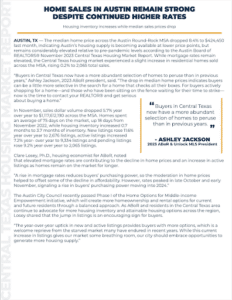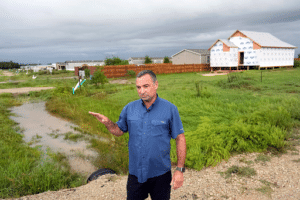Here’s what you need to know about Austin Real Estate today:
-
- Austin homeowners rejoice with $658 tax cut in 2023! 🏠
- Is it time to buy in Austin? Homes at 2021 prices! 💸
- DOJ sues Texas developer for targeting Hispanic borrowers. 🚨
- Northland Living, owned by Dallas Stars’ Gaglardi, eyes Austin expansion. 🌆
Texas Real Estate Market and Property Developments
Austin-area homeowners should expect lower property tax bills, county office says

Source: KUT Austin
Summary: Austin-area homeowners can expect lower property tax bills in 2023, with an average reduction of $658, according to the local tax office. This decrease is a result of voters approving a greater homestead exemption for school taxes, which reduces the amount of a homeowner’s property value subject to taxation for schools. Notably, homeowners who have not yet paid off their mortgages may not see this reduction reflected in their monthly bills due to rising property insurance rates. The Insurance Council of Texas predicts that insurance rate increases will slow in 2024.
Why this matters: The potential reduction in property taxes can be a significant selling point for real estate professionals in Austin, enabling them to provide their clients with value-added advice and financial insight. Furthermore, this development may influence the attractiveness of the Austin housing market and could affect future real estate strategies.
Worth buying a home in Austin now?
Source: Reddit r/RealEstate
Summary: The article presents a personal narrative of a homeowner in Austin, Texas, considering a move from a smaller, fully paid home, to a larger, more expensive one. The homeowner plans to retain the first property for rental income, which would cover annual property taxes and contribute towards the taxes for the second home. The new home, listed at $750k, is in a master-planned community, perfect for their expanding family needs. The homeowner is apprehensive about the financial strain the new purchase could bring, especially with the need for secondary income or a higher-paying job. The realtor suggests buying now before predicted price increases.
Why this matters: This anecdote provides real-world insight into the considerations for area homeowners when deciding to upgrade their home, highlighting the importance of understanding local market trends, and the role of rental income in owning multiple properties in Austin, Texas. This is particularly useful for real estate professionals seeking to advise homeowners in similar situations.
Austin Housing Buyer Recipe: Low Prices and Falling Interest Rates!

Source: ActiveRain
Summary: This article highlights the current state of the Austin, Texas real estate market, detailing a decrease in median home prices, an increase in housing inventory, and a decline in interest rates. The median sales price in Austin has dropped to $424,450, a price last seen in March 2021. Furthermore, housing inventory has increased, offering a wider selection for potential buyers and prolonging the selling process for sellers. Coupled with lower interest rates, these market conditions present advantageous opportunities for buyers.
Why this matters: With falling interest rates and lower median home prices, real estate professionals can leverage these market conditions to negotiate favorable deals for buyers, potentially driving sales growth and enhancing their reputation in the Austin market.
Austin developer aims to bring more housing, retail space to North Austin
Source: Austin Daily Real Estate News
Summary: An Austin-based development firm is in the planning stages of a transit-oriented apartment complex in North Austin, intending to address the city’s demand for housing and retail space. This development is part of an ongoing trend in the city’s real estate sector, with several firms actively involved in multifamily projects throughout the region.
Why this matters: This article underscores the ongoing demand for multifamily and retail space in Austin, providing potential investment opportunities for our readers and valuable insight into the future direction of the city’s real estate market.
Austin LGBTQ+ group wants to build multiple community centers

Source: KXAN
Summary: The Austin-based nonprofit, QWELL Community Foundation, plans to construct five LGBTQ+ community centers throughout the city in the coming years. These centers are expected to help overcome major barriers facing the local LGBTQ+ community, such as feelings of isolation and disconnection. The centers’ locations remain to be determined, but will be influenced by data from an annual well-being survey conducted among LGBTQ+ residents of several Central Texas counties. The centers will be part of mixed-use developments, including retail space and affordable housing, and will be constructed by the Houston-based company Penrose. The project will not require city funds and is expected to generate revenue for QWELL to reinvest in the community.
Why this matters: The establishment of new community centers with affordable housing within Austin’s mixed-use developments could provide a unique opportunity for real estate professionals to cater to a growing and underserved sector in the market.
NHL Dallas Stars owner’s development firm gears up for Austin projects
Source: The Real Deal
Summary: Northland Living, a development subsidiary of Northland Properties owned by Dallas Stars’ owner Tom Gaglardi, is expanding its operations in Austin. The company has purchased several development sites across Texas, with plans for a 40-acre mixed-use project in Cedar Park, and a condominium tower in downtown Austin. This marks a strategic shift for Northland, which has historically focused on hotel and resort developments.
Why this matters: Understanding Northland Living’s shift towards mixed-use and residential projects in Austin provides real estate professionals with insight into current market trends, allowing them to better advise their clients and identify growth opportunities in the evolving Austin real estate landscape.
Aprio expands in Texas

Source: Accounting Today
Summary: Top 50 firm Aprio LLP is merging with San Antonio- and Austin-based Ridout Barrett & Co. CPAs & Advisors, a move set to significantly expand Aprio’s construction practice. RBC focuses on construction and real estate, aligning well with Aprio’s strategic priorities and the growing needs of their Texas clients. This merger will double the size of Aprio’s construction practice and is expected to kickstart a significant expansion in Texas. The terms of the deal were undisclosed.
Why this matters: The merger between Aprio LLP and Ridout Barrett & Co. signals a significant expansion in Texas’ construction and real estate sector and offers real estate professionals the opportunity to leverage the broadened strengths and capabilities of these firms, particularly in construction and government contracting.
Predatory Lending and Legal Issues in Real Estate
DOJ alleges Texas developer targeted Hispanic borrowers in land sale scheme

Source: MyFox8
Summary: The U.S. Justice Department, in partnership with the Consumer Financial Protection Bureau (CFPB), has brought its first predatory mortgage lending case against Texas-based housing developer Colony Ridge. The lawsuit alleges that Colony Ridge targeted Hispanic borrowers with fraudulent statements and unfair loans, leading to a significant number of loan failures and home losses within this community. The developer is accused of exploiting language barriers and luring families into unaffordable loans for lands lacking proper infrastructure. This case underscores the significance of fair lending practices and the potential financial and societal impacts of unethical real estate operations.
Why this matters: The Colony Ridge case serves as a stark reminder for real estate professionals to uphold the highest ethical standards when dealing with clients, especially those from vulnerable communities, and highlights the importance of transparency in lending practices, which can be a key differentiator and value proposition for clients
Justice Dept. sues Texas developer, alleging it preyed on Hispanics

Source: NBC News
Summary: The U.S. Justice Department and the Consumer Financial Protection Bureau have filed a lawsuit against Texas-based Colony Ridge Development LLC, accusing the firm of targeting Hispanic homebuyers with predatory loans, false advertising, and subpar housing in an alleged illegal land scheme. The firm is said to have lured in buyers by falsely advertising homes with essential utilities and selling them property prone to flooding, which didn’t always have the promised utilities. Colony Ridge CEO John Harris has refuted these claims, describing the lawsuit as baseless and vowing to share the company’s true story moving forward.
Why this matters: This news underlines the significance for real estate professionals to ensure their practices are ethical and honest, as legal repercussions can not only impact business operations but also tarnish reputations in the industry. It highlights the importance of maintaining trust and integrity with clients, particularly in diverse markets.
Migration Trends and Demographics
Meet the typical mover leaving Texas: Millennial renters making $50,000 a year who are moving to California and Florida

Source: Business Insider
Summary: According to the Census Bureau, between 2021 and 2022, approximately 494,000 people moved out of Texas, with a significant majority being millennials or Gen Zers earning an average salary of $50,000. A Business Insider analysis found that people leaving Texas generally had slightly lower salaries and were employed at lower rates than those moving to the state. The most popular destinations for those leaving Texas were California, Florida, and Oklahoma. The data also showed that only 31.8% of those leaving Texas owned a home, considerably below the national homeownership rate of 66%. The report includes stories of former Texans who sought more affordable housing and a change in lifestyle, with one couple moving to Georgia and another to France.
Why this matters: This article provides valuable insights into the demographic and economic factors driving people to leave Texas, which can help real estate professionals adjust their strategies to better serve their clients’ needs and expectations and capitalize on emerging trends in the Texas real estate market.
